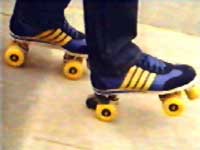Recreation, racing or road-runner - fat wheels were once better than thin
Roller skates are an ultimate icon of the 1970s - but the first demonstration of roller skates in Britain actually took place 200 years earlier.
| FROM THE ARCHIVES ...
 Sylvester McCoy camps it up as Joseph Merlin, the inventor of the roller skate Sylvester McCoy camps it up as Joseph Merlin, the inventor of the roller skate
- Eureka!, 1983
 Sylvester and the Eureka! team dramatise Merlin's painful mishap when exhibiting his prized invention Sylvester and the Eureka! team dramatise Merlin's painful mishap when exhibiting his prized invention
- Eureka!, 1983 (RealVideo)
|
In May 1770, Joseph Merlin, a Belgian inventor, showed off a skate that "skittered" across the floor on wooden wheels. According to a news report of the day, the demonstration ended "when, not having provided the means of retarding his velocity or commanding his direction, he impelled himself against a mirror of more than 500 Pounds value, dashed it to atoms, broke his instrument to pieces and wounded himself severely."
On a roll
By 1818, roller skates were being shown on a Berlin ballet stage, while the earliest known patent was issued to a Monsieur Petibled of France in the same year. The pastime received a major technological boost in 1884 when steel ball bearings were first used inside the wheels, a step that reduced the effort involved, thus increasing roller skating�s appeal.
About the same time the first world governing body, the predecessor of the modern day Federation Internationale de Roller Skating (FIRS), was formed.
Knowing when to stop
The main problem with early roller skates, as Merlin�s painfully embarrassing experience showed, was the lack of steering and braking.
 Toe-stops were conceived as early as 1876, but it took until the 1940s before they were commercially perfected.
Toe-stops were conceived as early as 1876, but it took until the 1940s before they were commercially perfected.
Coupled with smoother plastic wheels, toe-stops meant greater control, with dramatic braking and turning now enabling more exciting skating. This led to classic creative uses like roller-skating waitresses at drive-in diners, roller-delivery courier services, roller disco nights and roller hockey.
From disco to inferno
The first recorded roller skate hockey matches were played around 1870, with rules formalised by 1913. Britain excelled in the new sport between the wars, but after World War II Spain and Portugal began to dominate. The sport�s high water mark came at the 1992 Barcelona Olympics, where, as a demonstration sport, roller hockey was one of only two events to sell out a year in advance.
Roller skates and disco music came together for a beautiful time in the 1970s. But, for fickle reasons of fashion, the popularity of roller skating nose-dived in the mid-1980s. While it remains popular along the beach promenades of Los Angeles, today the roller skate has become the vinyl LP poor cousin to inline skating�s CD-age speed, technology and precision.
